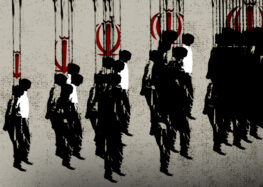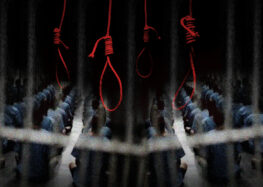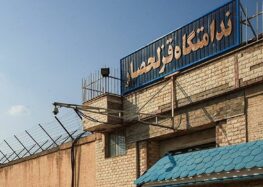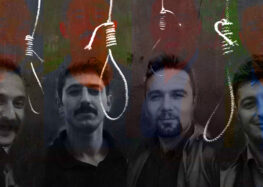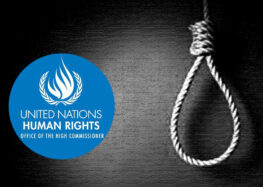Three Hangings in Three Days: The Islamic Republic Continues Its Killing Spree
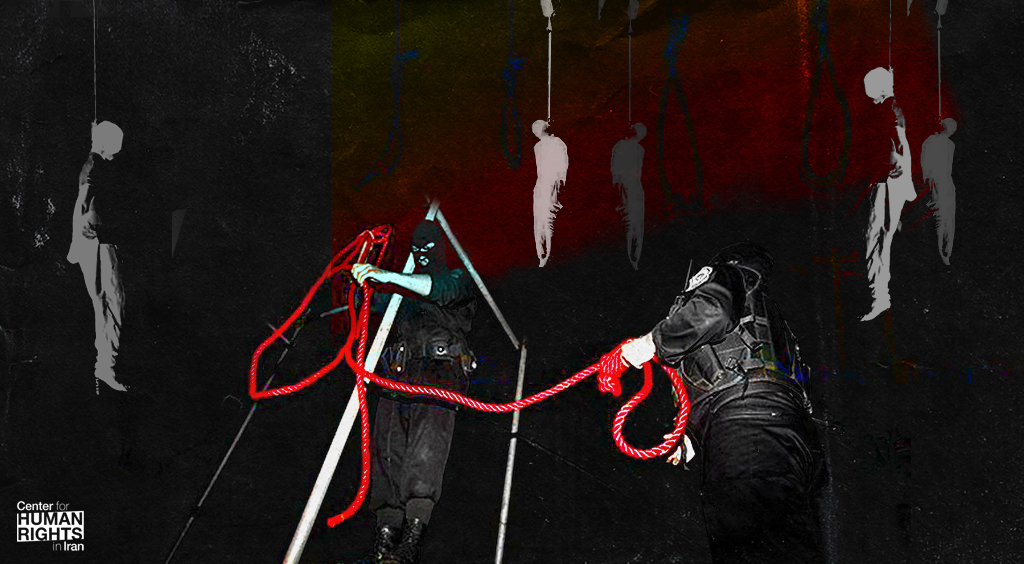 Executions to Silence Dissent After Grossly Unfair Trials Increase in Iran
Executions to Silence Dissent After Grossly Unfair Trials Increase in Iran
Dissidents and Minorities Targeted, 42 People Executed in Last Ten Days
May 8, 2023—The execution of three men over the last three days in Iran—two men for “insulting the prophet” and an Iranian-born Swedish citizen and dissident who was abducted in Turkey by Iranian agents—continues the intensifying use of the death penalty to silence dissent in the Islamic Republic. In just the past 10 days, 42 people, including 22 Baluchi citizens, have been executed.
“The Islamic Republic’s death machine is in high gear—state security forces shoot people in the streets and the judiciary hangs them,” said Hadi Ghaemi, executive director of the Center for Human Rights in Iran (CHRI).
“The Islamic Republic continues to sacrifice human life to instill terror in people’s hearts and crush dissent,” Ghaemi said.
CHRI condemns the rapidly increasing executions in Iran, which follow grossly unfair trials and egregious denials of due process, and urges the international community—governments worldwide, UN bodies, international legal associations, and human rights organizations—to speak out loudly and forcefully against this state-sanctioned killing.
In addition, the international community should directly address and condemn Islamic Republic laws that explicitly call for the death penalty for peaceful expressions of dissent, which represent egregious violations of international principles and obligations regarding freedom of expression.
“As long as there are charges in Iran’s Islamic Penal Code that stem from the Islamic Republic’s extremist religious beliefs, such as insulting the Prophet Mohammad or spreading corruption on earth, which are both punishable by death, the government will take advantage of these laws to advance its oppressive policies,” said Ghaemi.
According to Article 513 of Iran’s Islamic Penal Code, “Anyone who insults the sacred values of Islam or any of the Great Prophets or Shi’ite Imams or the Holy Fatima, if considered as Saab al-nabi [having committed actions warranting the hadd punishment for insulting the Prophet], shall be executed; otherwise, they shall be sentenced to one to five years’ imprisonment.”
The international community should clearly warn the Islamic Republic that intensifying diplomatic and economic isolation will follow these state-sanctioned killings, CHRI said.
Government Uses Extremist Laws to Advance Its Oppressive Policies
Youssef Mehrad and Sadrollah Fazeli-Zare were executed in the Central Prison in Arak on May 8 on the charge of “insulting the prophet,” reported Mizan, the judiciary’s official news agency.
“Based on the verdict, Sadrollah Fazeli-Zare, on charges of insulting the Prophet, apostasy, slander of the mother of the Prophet, desecrating the Quran by burning, insulting religious sanctities, and publishing private images of others without their consent, and Yousef Mehrad, on charges of insulting the Prophet and disrespecting religious and Islamic sanctities, were sentenced to death,” the report said.
Mehrad was the father of three children and Fazeli-Zareie took care of his elderly mother. The two were arrested in June 2020, along with five others, for running the “Criticism of Superstition and Religion” channel on the Telegram messaging app.
The death sentences against Mehrad and Fazeli-Zareie were issued by Judge Mohammad Reza Mehrandish of Branch 1 of the Criminal Court in Arak, Central Province, on April 22, 2023. After their arrest, they were held in solitary confinement for two months and deprived of the right to receive visits and contact relatives for eight months, HRANA reported.
A source familiar with the case told CHRI that the families of the two prisoners, after learning through their children’s cellmates that they had been transferred to solitary confinement, went to the prison for a final visit. On their way, they were informed that their children had been returned from solitary confinement to the general ward and that there was no possibility of their execution. The source told CHRI that “immense pressure” has been exerted on the families to not speak publicly about the cases.
“The execution of these citizens is a blatant example of the government-sanctioned murder of citizens who have different beliefs than those of the Islamic Republic’s leaders, and a clear violation of one of the most fundamental rights of every human being, which is freedom of belief,” said Ghaemi.
In addition to Article 513 of Iran’s Islamic Penal Code, Article 262 is similarly used to stifle peaceful dissent and freedom of expression. It states: “Anyone who swears at or commits qazf against the Great Prophet [of Islam] (peace be upon him) or any of the Great Prophets, shall be considered as Sāb ul-nabi [a person who swears at the Prophet], and shall be sentenced to the death penalty.”
Abducted Dissident Also Executed After Unfair Trial
On May 6, meanwhile, Iran executed the Iranian-born Swedish citizen and dissident Habib Farajollah Chaab, who was accused of being behind a deadly 2018 attack on a military parade.
Chaab was a founder of a separatist group calling for independence for ethnic Arabs in Iran’s south-western Khuzestan province. He had been living in exile in Sweden for a decade when he was lured to Turkey by Islamic Republic agents and then forcibly taken to Iran in 2020. Chaab’s “trial” was a farce, Ghaemi tweeted.
Minorities Increasingly Targeted for Execution
These executions follow a wave of intensifying executions, especially among minority groups.
At least 20 ethnic Baluchis were executed in Sistan and Baluchestan province between April 29, 2023, and May 4, 2023, according to Haalvsh human rights news: Madineh Sabzavan (39, convicted of drug trafficking), Mousa Gorgij (55, drug trafficking), Ehsan Gorgij (30, drug trafficking), Mohammad Shibak (33, drug trafficking), Abdollah Zaroozehi (47, drug trafficking), Eid Mohammad Shadman (murder), Mahmoud Rahmani (murder), Aminollah Karimi (40, drug trafficking), Nematollah Rigi Ladiz (48, drug trafficking), Golmohammad Narouie i (31, murder), Abdolsattar Shahouzahi (murder), Saboor Shahbakhsh (32, drug trafficking), Lal Mohammad Narouie Barahouie (43, drug trafficking), Abdolbasir Bejam (29, drug trafficking), Amir Rameshk (34, drug trafficking), Hossein Rigi (38, drug trafficking), Jaber Aminifar (30, drug trafficking), Nourahmad Nahtani (40, drug trafficking), Edris Gorgij (30, drug trafficking) and an unidentified woman (murder). The wave of executions was criticized by the outspoken Friday prayer leader of Zahedan, Mowlana Abdolhamid, in his sermon on May 4: “Where in Baluchestan have you created jobs that today you are executing people [for drug trafficking]? What has the government done for the people? Most people turn to drug trafficking because they’re hungry and don’t have jobs; why do you execute them? You neither created jobs in this province nor allowed them to study. Your only art is to execute people, nothing more.”
There were also several executions in Iran’s Kurdish regions. Salaheddin Majidi and Abdollah Khan-Mohammadi were executed on May 6 for drug-related offenses in the Central Prison in Salmas, West Azerbaijan province, the Kurdistan Human Rights Network reported. On May 5, Faramarz Shakhsi was executed for a drug-related offense in the Central Prison in Oroumiyeh, West Azerbaijan province.
Women Prisoners in Iran Condemn “the Executions, Massacres and Genocides”
Six women activists imprisoned in Iran’s Evin Prison—Narges Mohammadi, Sepideh Qolian, Bahareh Hedayat, Golrokh Iraee, Zahra Sarv and Nasrin Javadi—released a statement saying: “The increase in accusations of ‘corruption on earth’ and ‘waging war,’ and death sentences and executions in accelerated trials throughout the country, from Sistan and Baluchestan, Khuzestan, Azerbaijan, and Kurdistan to Tehran, are devoid of legitimacy. We women prisoners in Evin, condemn the executions, massacres, and genocides by the tyrannical government and demand an immediate stop.”
Islamic Republic Executions Significantly Increased in 2023
Amnesty International reported in March 2023 that at least 94 people were executed in Iran in January and February alone, “amid horrific sexual violence and other torture allegations,” all after unfair trials, in a significant increase from last year’s numbers. Amnesty noted the “routine” use of so-called confessions extracted under torture to convict in capital cases in the Islamic Republic. Meanwhile, at least 582 people were executed in Iran 2022, a 75% increase compared to 333 in 2021, according to a report by the Norway-based Iran Human Rights (IHR) and France’s Together Against the Death Penalty (ECPM).
U.N. High Commissioner for Human Rights Volker Turk has called the executions in Iran state-sanctioned killings.
Read this article in Persian

